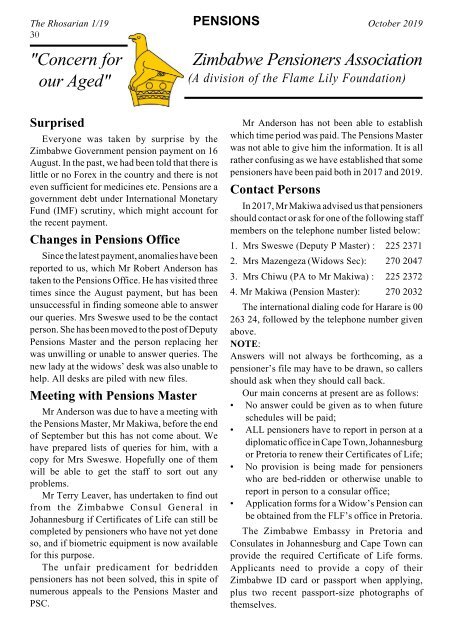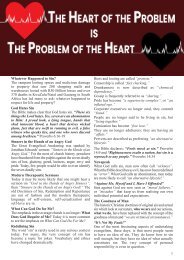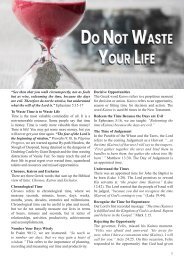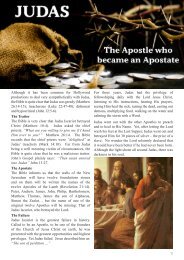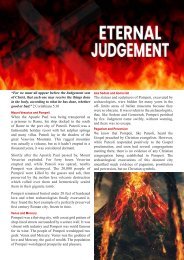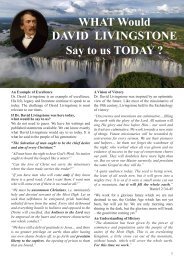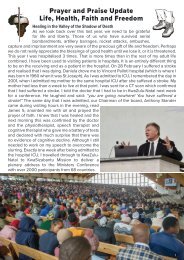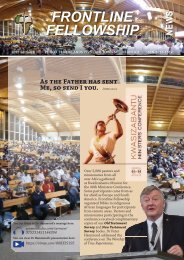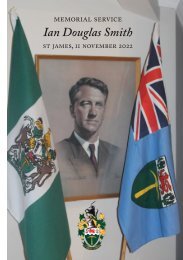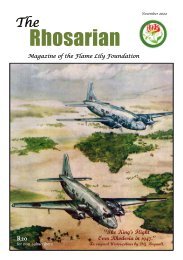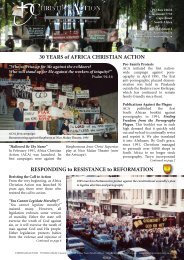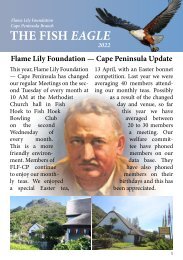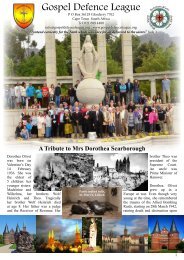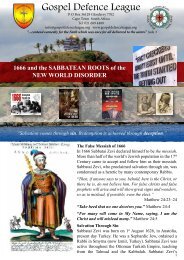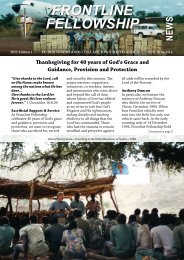Rhosarian 2019
You also want an ePaper? Increase the reach of your titles
YUMPU automatically turns print PDFs into web optimized ePapers that Google loves.
The <strong>Rhosarian</strong> 1/19<br />
A man named Charles Rudd, on behalf of<br />
Rhodes, obtained from Lobengula, the Matabele<br />
chief in Bulawayo, a concession to “win and<br />
procure” all the “metals and minerals situated and<br />
contained in my Kingdoms, principalities and<br />
dominions”. ... The new British South Africa<br />
Company successfully petitioned the Queen for a<br />
Royal Charter. The Charter acknowledged, in<br />
appropriate legalese, “That the existence of a<br />
powerful British Company, controlled by those of<br />
Our subjects in whom We have confidence, and<br />
having its principal field of operations in that<br />
region of South Africa lying to the north of<br />
Bechuanaland and to the west of Portuguese East<br />
Africa, would be advantageous to the commercial<br />
interests of Our subjects in the United Kingdom<br />
and in Our Colonies,” and empowered the<br />
Company to promote “trade, commerce and good<br />
government (including the regulation of liquor<br />
traffic with the Natives)”, to suppress “the slave<br />
trade - of which there was no evidence at all - and<br />
open up the territories “to the immigration of<br />
Europeans”. The Company would also “to the<br />
best of its ability preserve peace and order” and<br />
for this purpose was authorised to “establish and<br />
maintain a force of police”. ...<br />
The occupation would be a commercial<br />
undertaking; the whole business of founding a<br />
new country would be put out to contract for<br />
recruiting, provisioning, equipping and paying a<br />
pioneer force of nearly two hundred men, who<br />
would become the first white settlers in the new<br />
country; also for making “a good wagon road”<br />
from Palapye, in Bechuanaland, to Mount<br />
Hampden, which was to be the destination in<br />
Mashonaland; and for “holding and occupying”<br />
the new territory until 30 September 1890, after<br />
which the Company would relieve Johnson of his<br />
responsibilities.<br />
Frank Johnson’s tender was £87 500, which<br />
was a lot of money in those days.<br />
Rhodes believed at first that this was all it<br />
would cost him to occupy the country. He certainly<br />
promised Johnson and his partners - and, indeed,<br />
all the pioneers - free land and free mining claims<br />
when they reached Mashonaland, but as these<br />
were costing him nothing he could afford to be<br />
generous. But there was one factor he had<br />
overlooked - or had probably chosen to disregard:<br />
BSAP ANNIVERSARY<br />
October <strong>2019</strong><br />
29<br />
the danger of sending a body of men into a<br />
wilderness inhabited by warlike savages without<br />
some protection against attack. The British<br />
Government - as represented by Sir Henry Loch,<br />
the High Commissioner in Cape Town - was<br />
adamant that the pioneer force must be provided<br />
with an adequate military escort.<br />
Naturally Loch was not prepared to recommend<br />
to his Government that it should assist in financing<br />
Rhodes’s commercial enterprise by supplying<br />
troops at the expense of the British taxpayer. He<br />
made it clear to Rhodes that he would have to<br />
arrange the escort at his own expense. Rhodes<br />
demurred; but when Sir Henry Loch threatened to<br />
recommend to Britain that the Charter should be<br />
cancelled if he refused to comply, Rhodes realised<br />
he had no option.<br />
At first, Rhodes proposed raising a police force<br />
of only a hundred men. ... But as the later idea<br />
developed of two hundred pioneers - who would<br />
really only be civilians, although it was agreed to<br />
attest them for the duration of the march - making<br />
their perilous way to Mount Hampden, four hundred<br />
and fifty miles inside the Matabele-dominated<br />
country, even less cautious characters than Sir<br />
Henry Loch were beginning to feel that a force of<br />
only a hundred men would be a far from adequate<br />
escort. Frederick Selous himself, who had been<br />
appointed to act as guide to the pioneer column and<br />
knew the territory as well as anyone, persuaded<br />
Rhodes that he needed at least two hundred and<br />
fifty. This disturbed Sir Henry Loch even more;<br />
indeed the High Commissioner was by no means<br />
the only person in high places who was growing<br />
nervous; and from a number of quarters Rhodes<br />
was prevailed upon, finally without too much<br />
demur, to persuade his co-directors in London to<br />
authorise a force of five hundred - all to be paid for<br />
by the Company.<br />
The authority was given; but the concept of this<br />
escort for the pioneer column had now clearly<br />
grown. It was becoming a formidable force in its<br />
own right, needing a separate organisation and a<br />
distinctive identity, and it would march with the<br />
pioneer column into Mashonaland, to become a<br />
permanent feature of the establishment. And so it<br />
was that the British South Africa Company’s Police<br />
came into existence before anyone had set foot as<br />
a settler in the new country.


